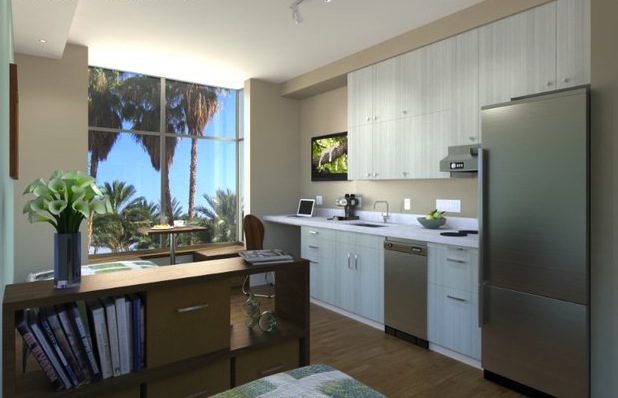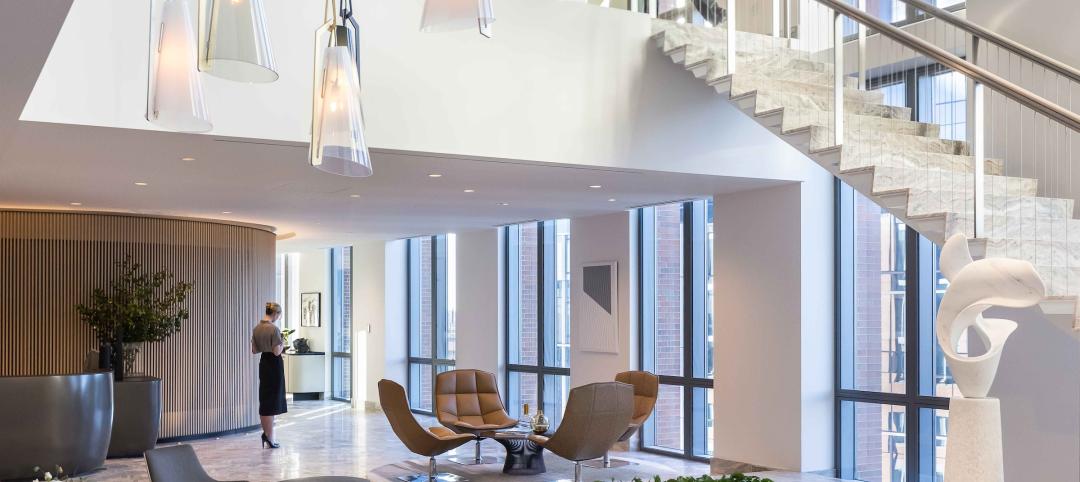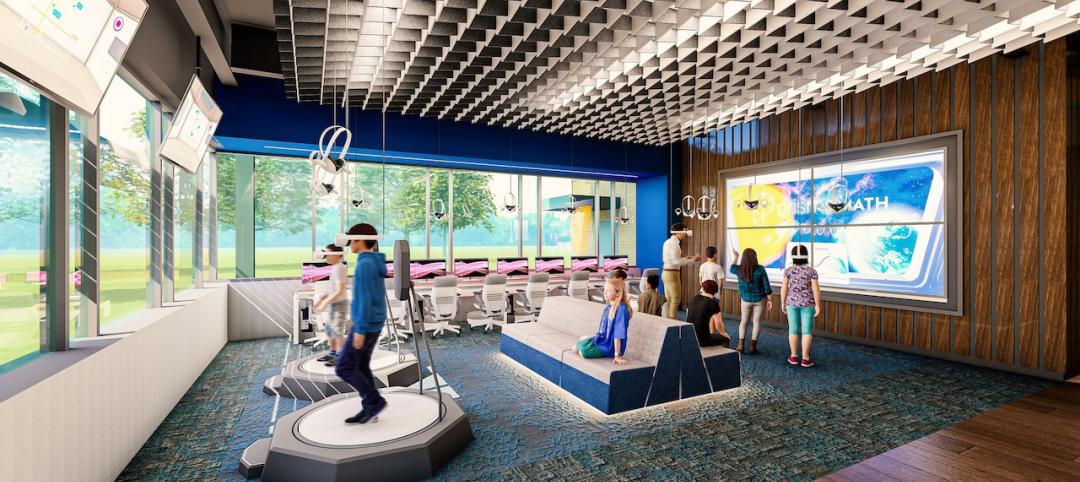New research from the Urban Land Institute suggests that micro units—typically larger than a one-car garage, smaller than a double—have staying power as a housing type that appeals to urban dwellers in high-cost markets who are willing to trade space for improved affordability and proximity to downtown neighborhoods.
The report, "The Macro View on Micro Units," includes an analysis by MPF Research of more than 400 rental apartment communities (comprising more than 90,000 units) built in 2012-2013 in the 35 U.S. metro areas that experienced the highest concentration of multifamily construction during that period. It also includes findings from more than 3,500 responses to an early 2014 survey by Kingsley Associates of renters of both conventional apartments and micro units; and case studies drawn from 30 existing and 18 planned rental communities with micro units that were identified by RCLCO (Robert Charles Lesser & Co.).
The report was prepared for ULI’s Multifamily Housing Councils with support from a grant awarded in 2013 by the ULI Foundation.
Key findings from the report:
• Micro units are typically about 350 square feet in size, but can range from less than 250 square feet to 500 square feet, depending on the city building code requirements. They have no separate bedroom; sleeping space is combined with living space, but they do have fully functional bathrooms and kitchens. Micro unit communities place heavy emphasis on multiple amenities outside the units themselves, such as shared communal spaces that encourage socializing and foster a sense of community.
• The target market profile for micro units is predominantly young professional singles, typically under 30 years of age, earning less than $40,000, trending slightly more toward males than females. Other market segments include couples, older single empty-nesters, and temporary users. Singles currently living with roommates tend to be the most interested in making the switch from a traditional unit to a micro unit.
• The appeal of micro units is largely about economics, as well as place and privacy. Those interested in micro units are seeking to lower their rental costs (the units typically rent for 20 to 30 percent less than larger units); they are also drawn to the trendy “hip” locations where micro units tend to be built, and by the ability to live alone.
• Nearly a quarter of the renters surveyed who live in conventional apartments said they would be interested in renting a micro unit. Fifty-eight percent said they would not be interested, primarily due to the lack of a separate bedroom, less storage space and less living or dining space.
• Those who are interested in switching to micro units ranked access to a grocery store as their top priority for a neighborhood amenity, followed by restaurants and a gym. In terms of project amenities, a laundry room ranked highest, followed by assigned parking, visitor parking, and a fitness center; and for unit amenities, a washer and dryer ranked first, followed by built-in closet/drawers and storage space. More than half were interested in multi-functional, convertible furniture.
• Those currently living in micro units cited location as the top factor influencing their decision to move into the small units, followed by price, proximity to work/education institutions, proximity to neighborhood amenities, the ability to live alone, and proximity to transit.
• Smaller and micro units outperform conventional units in the marketplace, in terms of achieving higher occupancy rates and garnering significant rental rate premiums (rent per square foot) compared with conventional units.
• The market is shifting toward a greater mix of smaller studio and one-bedroom units being included in traditional apartment communities, as well as more construction of micro-unit communities. Studio and one-bedroom units accounted for nearly 51 percent of the 2012-2013 completions, up drastically from 41 percent in 2002-2003.
• Despite the rising popularity of micro units, some developers are building in the flexibility to easily convert two side-by-side units into one larger unit if demand shifts back to more conventional models.
RCLCO’s case study research identifies four trends (primarily associated with Generation Y) that are linked to the rising appeal of the units: delayed household formation, an increase in single-person households, a decrease in car ownership, and the tendency to accumulate fewer belongings and participate in the “sharing economy.”
Among the case studies that contributed to the best practices and lessons learned: Factory 63 in Boston; The Flats in Chicago; Lofts at 7 in San Francisco; Arcade Providence in Providence, Rhode Island; Eko Haus Freedom Center in Portland, Oregon; and My Micro NY in Kips Bay, New York.
“Whether this (increased development of micro units) turns out to be a lasting phenomenon or a passing fad, micro units have renewed the focus on efficient layouts and innovative design solutions,” concludes the report.
Download a free PDF version of The Macro View on Micro Units report.
Related Stories
Luxury Residential | Jan 30, 2024
Lumen Fox Valley mall-to-apartments conversion completes interiors
Architecture and interior design firm Morgante Wilson Architects (MWA) today released photos of its completed interiors work at Lumen Fox Valley, a 304-unit luxury rental community and mall-to-apartments conversion.
Airports | Jan 30, 2024
Rafael Viñoly Architects’ design for the new Florence, Italy, airport terminal will feature a rooftop vineyard
At Florence, Italy’s Aeroporto Amerigo Vespucci, the new international airport terminal will feature a fully operating vineyard on the facility’s rooftop. Designed by Rafael Viñoly Architects, the terminal is expected to see over 5.9 million passengers annually. Renderings for the project have recently been released.
Giants 400 | Jan 29, 2024
Top 160 Workplace Interior Architecture Firms for 2023
Gensler, Interior Architects, HOK, SmithGroup, and Perkins&Will top BD+C's ranking of the nation's largest workplace interior and interior fitout architecture and architecture engineering (AE) firms for 2023, as reported in the 2023 Giants 400 Report.
Mixed-Use | Jan 29, 2024
12 U.S. markets where entertainment districts are under consideration or construction
The Pomp, a 223-acre district located 10 miles north of Fort Lauderdale, Fla., and The Armory, a 225,000-sf dining and entertainment venue on six acres in St Louis, are among the top entertainment districts in the works across the U.S.
Laboratories | Jan 25, 2024
Tactical issues for renovating university research buildings
Matthew Plecity, AIA, ASLA, Principal, GBBN, highlights the connection between the built environment and laboratory research, and weighs the benefits of renovation vs. new construction.
K-12 Schools | Jan 25, 2024
Video: Research-based design for K-12 schools
Two experts from national architecture firm PBK discuss how behavioral research is benefiting the design of K-12 schools in Texas, Florida, and other states. Dan Boggio, AIA, LEED AP, NCARB, Founder & Executive Chair, PBK, and Melissa Turnbaugh, AIA, NCARB, Partner & National Education & Innovation Leader, PBK, speak with Robert Cassidy, Executive Editor, Building Design+Construction.
Women in Design+Construction | Jan 25, 2024
40 Under 40 Class of 2023 winner Kimberly Dowdell inaugurated as AIA 2024 President
The American Institute of Architects (AIA) has announced the inauguration of Kimberly Dowdell, AIA, NOMAC, NCARB, LEED AP BD+C, Principal and Director of Strategic Relationships at HOK and BD+C 40 Under 40 superstar, as its 100th president.
Senior Living Design | Jan 24, 2024
Former Walgreens becomes affordable senior living community
Evergreen Real Estate Group has announced the completion of Bellwood Senior Apartments. The 80-unit senior living community at 542 25th Ave. in Bellwood, Ill., provides independent living options for low-income seniors.
AEC Tech | Jan 24, 2024
4 ways AEC firms can benefit from digital transformation
While going digital might seem like a playground solely for industry giants, the truth is that any company can benefit from the power of technology.
Giants 400 | Jan 23, 2024
Top 60 Parking Structure Architecture Firms for 2023
Choate Parking Consultants, Page Southerland Page, Gensler, AO, and Elkus Manfredi Architects top BD+C's ranking of the nation's largest parking structure architecture and architecture engineering (AE) firms for 2023, as reported in the 2023 Giants 400 Report.

















